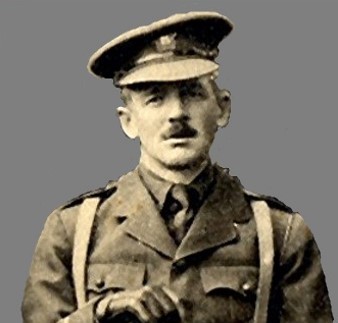|
Oct 20, 1879
|
Born in Toronto, Ontario to
Robert Holt and Mary Isabel (nee Cowperthwaite) Gray
|
|
May 10, 1905
|
Married to Helen Harris Putnam
in Toronto, Ontario
|
|
Jun 9, 1913
|
Shown on payroll of “F”
Company, 59th Stormont and Glengarry Regiment with the rank of
Lieutenant
|
|
Jun 15, 1914
|
Shown on payroll of “F”
Company, 59th Stormont and Glengarry Regiment with the rank of
Captain
|
|
Nov 9, 1914
|
Attested into the 21st
Battalion CEF in Kingston, Ontario
Ø Rank Captain
Ø Next of kin given
as Helen Harris Gray, wife, Cornwall, Ontario
Ø Previous occupation
given as Manufacturer
Ø Previous military
experience given as 2nd Regiment, Queen’s Own Rifles in Toronto
and the 59th Stormont and Glengarry Regiment
Ø Religion given as Church
of England
Ø Posted “E” Company
o This was later
reorganized into “D” Company
o He was later posted
to “C” Company
The battalion trained in the
Kingston area through the winter with headquarters in the Kingston Armouries
|
|
Dec 24, 1914
|
Granted leave until December
27
|
|
Feb 11, 1915
|
Granted sick leave
|
|
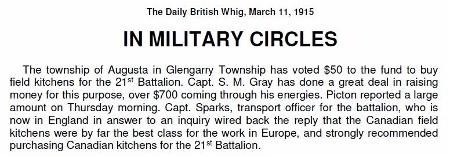

|
|
Apr 12, 1915
|
Promoted to the rank of Major
and assumed command of “C” Company
|
|
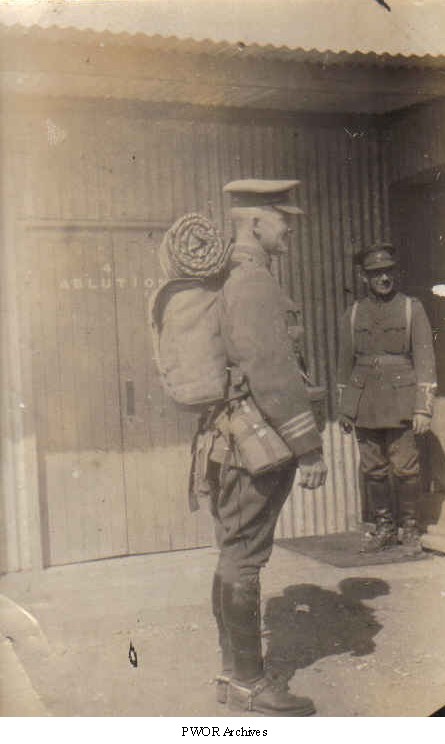
|
|
May 6, 1915
|
Embarked the RMS Metagama in
Montreal, Quebec
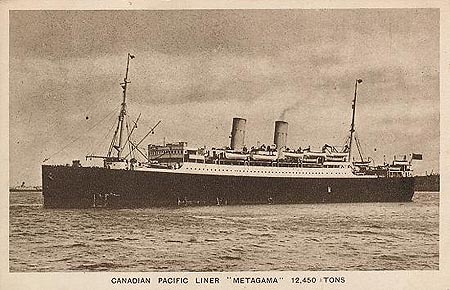
|
|
May 15, 1915
|
Disembarked in Devonport,
England and the battalion proceeded to the West Sandling Camp, near Hythe,
Kent to continue training
|
|
Sep 14, 1915
|
Embarked the St. Seiriol in
Folkestone
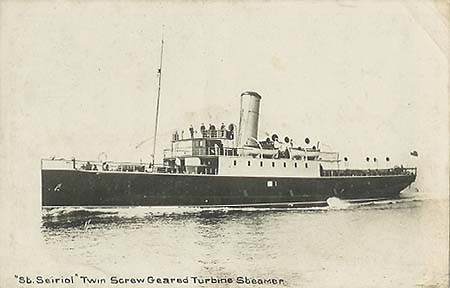
|
|
Sep 15, 1915
|
Disembarked in Boulogne,
France and the battalion proceeded to St. Omer
|
|
Dec 31, 1915
|
While in the front lines on
the Ypres Salient, Major Gray suffered from gas exposure on 2 occasions
during the month of December but remained with the battalion and refused to
report sick. On New Year’s Eve his
flare gun accidentally fired while in his dug out and caused respiratory
distress from the gasses.
|
|
Jan 2, 1916
|
Admitted to the No. 5 CFA
(Canadian Field Ambulance) with a diagnosis that reads Influenza and placed
in the Division Rest Station at Mont Noir, north of Bailleul, France to
recuperate
|
|
Jan 13, 1916
|
Discharged to duty from the
rest station
|
|
Feb 10, 1916
|
Proceeded on leave of absence
to England
|
|
Feb 20, 1916
|
Rejoined the battalion from
leave
|
|
Apr 23, 1916
|
Admitted to the 1st
Division Rest Station with a diagnosis that reads Neurasthenia. It was also noted as Shell Shock
|
|
Apr 26, 1916
|
Transferred to the No. 10 CCS
(Casualty Clearing Station) before being transferred to the Duchess of
Westminster Hospital in Etaples for treatment
|
|
Apr 29, 1916
|
Invalided to England aboard the
Hospital Ship Brighton
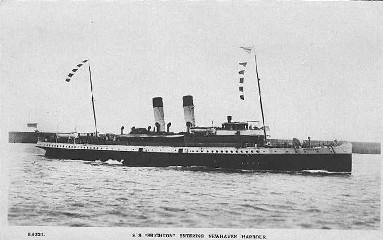
On arrival in England he was admitted
to the No. 4 London General Hospital, Denmark Hill, London
On admission he is noted as being
extremely nervous, weak, and suffers from tremors
Posted to the General List of
Officers for pay purposes while in hospital
|
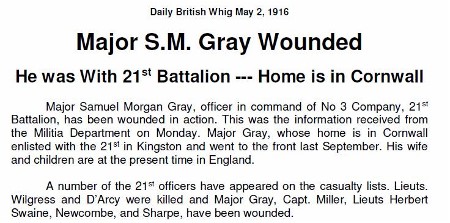
|
|
May 3, 1916
|
Discharged from hospital and
granted sick leave
|
|
Jul 13, 1916
|
Medical Board in London notes
little improvement in his condition.
He suffers from headaches, poor sleep and is very weak
|
|
Jul 19, 1916
|
Admitted to the Granville
Special Hospital, Ramsgate with a diagnosis that reads NYD (Not Yet
Determined). This was later changed to
read Shell Shock
|
|
Aug 14, 1916
|
Medical Board in London notes some
improvement but he is not yet fit for general service and not expected to
improve for at least 6 weeks.
Discharged from hospital and
posted to the 39th Reserve Battalion in West Sandling
|
|
Sep 27, 1916
|
While with the reserve
battalion, his horse fell on him and he was badly shaken up.
Medical Board declares him
unfit for service for 1 month
|
|
Oct 12, 1916
|
Medical Board declares him
unfit for further service and recommends that he be returned to Canada for
discharge
|
|
Oct 18, 1916
|
SOS (Struck Off Strength) the
39th Battalion on being declared permanently unfit and to be
returned to Canada
|
|
Oct 21, 1916
|
Embarked the SS Caronia in
Liverpool
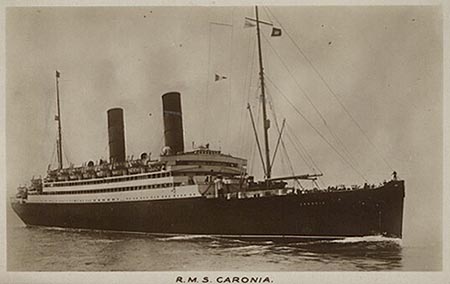
|
|
Oct 28, 1916
|
Disembarked in Halifax, Nova
Scotia and proceeded to Kingston, Ontario
|
|
Jan 8, 1917
|
Medical Board in Kingston,
Ontario finds that he is still suffering from disability, in that he is 15
pounds below normal weight, sleeps poorly, is nervous and irritable, and
suffers from poor memory. Board
recommends that he be re-examined in 6 months
|
|
Jun 1, 1917
|
Medical Board in Kingston,
Ontario finds that he is still suffering from shell shock but improving. He tires easily and still shows marked
nervousness. The condition is expected
to continue for at least 6 months
|
|
Oct 26, 1917
|
Medical Board in Kingston
notes
Ø Soldier is mentally
and physically exhausted
Ø Severe headaches
Ø Poor memory
Ø Suffers from
insomnia
Ø Somewhat depressed
Ø Tremors in hands
Ø Suffers from
shortness of breath
Board recommends discharge
from military service
Following the end of the war
the 1914-15 Star, British War Medal and Victory Medals were sent to him at
First St., Cornwall, Ontario
|
|
Nov 3, 1934
|
Appointed Honorary Vice
President of the Cornwall Chapter of the 21st Battalion
Association
|
|
Mar 21, 1960
|
Samuel Morgan Gray died in
Cornwall, Ontario and was buried in the Mount Pleasant Cemetery, Toronto,
with full honours
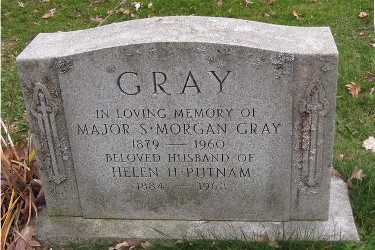
|
|
